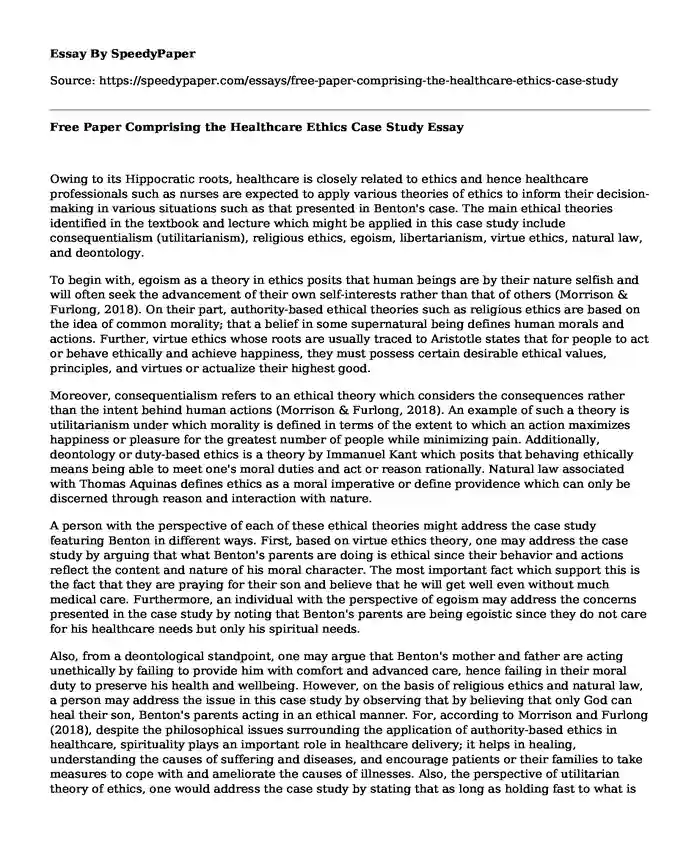
| Type of paper: | Course work |
| Categories: | Ethics Healthcare |
| Pages: | 3 |
| Wordcount: | 728 words |
Owing to its Hippocratic roots, healthcare is closely related to ethics and hence healthcare professionals such as nurses are expected to apply various theories of ethics to inform their decision-making in various situations such as that presented in Benton's case. The main ethical theories identified in the textbook and lecture which might be applied in this case study include consequentialism (utilitarianism), religious ethics, egoism, libertarianism, virtue ethics, natural law, and deontology.
To begin with, egoism as a theory in ethics posits that human beings are by their nature selfish and will often seek the advancement of their own self-interests rather than that of others (Morrison & Furlong, 2018). On their part, authority-based ethical theories such as religious ethics are based on the idea of common morality; that a belief in some supernatural being defines human morals and actions. Further, virtue ethics whose roots are usually traced to Aristotle states that for people to act or behave ethically and achieve happiness, they must possess certain desirable ethical values, principles, and virtues or actualize their highest good.
Moreover, consequentialism refers to an ethical theory which considers the consequences rather than the intent behind human actions (Morrison & Furlong, 2018). An example of such a theory is utilitarianism under which morality is defined in terms of the extent to which an action maximizes happiness or pleasure for the greatest number of people while minimizing pain. Additionally, deontology or duty-based ethics is a theory by Immanuel Kant which posits that behaving ethically means being able to meet one's moral duties and act or reason rationally. Natural law associated with Thomas Aquinas defines ethics as a moral imperative or define providence which can only be discerned through reason and interaction with nature.
A person with the perspective of each of these ethical theories might address the case study featuring Benton in different ways. First, based on virtue ethics theory, one may address the case study by arguing that what Benton's parents are doing is ethical since their behavior and actions reflect the content and nature of his moral character. The most important fact which support this is the fact that they are praying for their son and believe that he will get well even without much medical care. Furthermore, an individual with the perspective of egoism may address the concerns presented in the case study by noting that Benton's parents are being egoistic since they do not care for his healthcare needs but only his spiritual needs.
Also, from a deontological standpoint, one may argue that Benton's mother and father are acting unethically by failing to provide him with comfort and advanced care, hence failing in their moral duty to preserve his health and wellbeing. However, on the basis of religious ethics and natural law, a person may address the issue in this case study by observing that by believing that only God can heal their son, Benton's parents acting in an ethical manner. For, according to Morrison and Furlong (2018), despite the philosophical issues surrounding the application of authority-based ethics in healthcare, spirituality plays an important role in healthcare delivery; it helps in healing, understanding the causes of suffering and diseases, and encourage patients or their families to take measures to cope with and ameliorate the causes of illnesses. Also, the perspective of utilitarian theory of ethics, one would address the case study by stating that as long as holding fast to what is taught in the Bible and putting their faith in the word of God helps bring happiness and pleasure to Benton, it is ethical for his parents to deny him comfort care as recommended by his physician.
In conclusion, the ethical perspective which aligned most with my own point of view was duty-based ethics (deontology). As a healthcare professional, this theory aligns with my strong belief in the notion that we all have a duty to help in ameliorating other people's pain and promoting their health or wellbeing. However, difficult perspective for me to assume was the authority-based or religious ethics theory which exhorts us to only believe in the divine power of God to heal. I cannot fathom the fact that Benton's father believes that prayers alone will heal his son without the care recommended by his physician.
Reference
Morrison, E.E., & Furlong, B. (2018). Healthcare ethics: Critical issues for the 21st century. Burlington, MA: Jones & Bartlett Learning
Cite this page
Free Paper Comprising the Healthcare Ethics Case Study. (2022, Sep 01). Retrieved from https://speedypaper.com/essays/free-paper-comprising-the-healthcare-ethics-case-study
Request Removal
If you are the original author of this essay and no longer wish to have it published on the SpeedyPaper website, please click below to request its removal:
- Free Essay: Recommended PPM-based Growth Strategies for Wedding SMEs in Korea
- Relationships Essay Sample for Free Download
- Free Essay Example on The Gay Science Book
- Free Essay: Why Legalizing Gay Marriages is Inevitable
- Finance Essay Sample: Introduction to Financial Analysis
- Essay Sample for Everyone: Movies and the Impact of Images
- Essay Example about Cultural Differences Between the United States and China.
Popular categories




